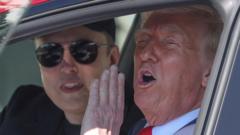Tesla faces significant challenges with a notable drop in revenue and heightened political scrutiny, prompting Musk to shift his focus back to the company.
Musk Scales Back Political Role Amid Tesla's Profit Decline

Musk Scales Back Political Role Amid Tesla's Profit Decline
Elon Musk announces reduced involvement in government duties as Tesla's first-quarter profits plummet.
Elon Musk has declared his intention to lessen his involvement in government affairs as Tesla grapples with significant drops in profits and revenue during the first quarter of 2025. The electric vehicle manufacturer reported an alarming 20% decrease in automotive revenue compared to last year, alongside an astonishing decline of over 70% in profits, sparking concern among investors.
In a recent statement, Tesla revealed it garnered $19.3 billion in total revenue, falling short of the $21.1 billion projected by analysts. This decline is attributed to reduced sales and increasing backlash associated with Musk's political presence within Donald Trump's administration. The firm expressed caution about its future outlook, citing "changing political sentiment" as a crucial factor that could adversely affect customer demand.
Musk, who has been actively engaged in Trump's administration spearheading the Department of Government Efficiency (Doge), acknowledged that his governmental responsibilities diverted his attention from Tesla. He emphasized that he will significantly reduce his commitment to Doge starting next month, planning to allocate only one to two days a week to government matters, contingent upon the president's wishes.
The backlash against Musk's political activities has translated into worldwide protests and boycotts against Tesla, which he attributed to attacks from detractors aimed at both him and the Doge initiative. Despite these challenges, Musk insists that his work within the Doge framework is important, claiming that much of the foundational work has been completed.
Additionally, Tesla has been grappling with impacts from the trade policies implemented under the Trump administration, particularly tariffs on Chinese imports, which pose a risk to both supply chains and production costs. Musk has countered claims that Tesla is heavily affected by tariffs, asserting that the company features localized supply chains across North America, Europe, and China.
Still, analysts warn of Tesla's vulnerabilities in an increasingly competitive market. Dan Coatsworth, an investment analyst at AJ Bell, stated that the firm is "facing fierce competition," compounded by potential disruptions from ongoing trade policies. Despite showcasing optimism about future growth driven by artificial intelligence, investors remain skeptical, leading to a substantial drop of about 37% in Tesla's shares this year.
Shares bounced back slightly by over 5% in after-hours trading following the latest earnings report, but analysts remain cautious about the company’s outlook amid these mounting issues.






















